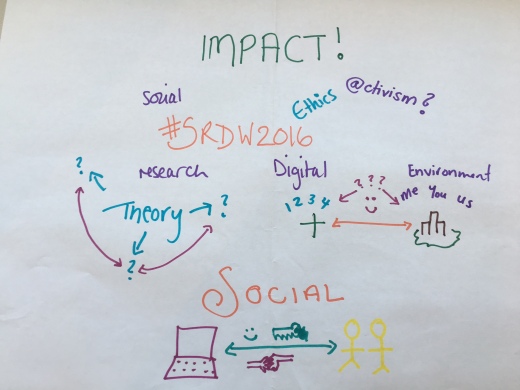This is my fourth and final blog for this semester and an opportunity (as well as assessment requirement) to reflect on my unit “Social Research in the Digital World” (#SRDW2016) and on my professional oral viva held with my Unit Coordinator last week. While not as challenging as a PhD viva, in preparing, it did bring out some questions as to where I was going to take what I have learned into the future.
My unit coordinator likes to introduce creative ways to get us thinking and this viva was no different. We kicked off with an ‘ice breaker’ activity, five minutes to document our learning experience in words or images on paper. Here is what I produced:

So my plan here is to summarise what I drew, reflect on this, and then seek to consolidate all those thoughts to solve the big question “what do I want to be when I grow up?” easy right?!
IMPACT! This was the first word I wrote and it was deliberately capitalised and in large font. Why? I feel it’s the main reason I began exploring the digital world. While I find online an interesting space to interrogate and love we have capability to extract data to analyse and ponder why people do what they do, I want to make an IMPACT with my research. How? That’s the big question and this led in part to my @ctivism? and Social drawings. I had begun reading up on digital activism (McCaughey & Ayers eds 2003; Joyce ed. 2010), although my “fear of mean objectors” (see blog 1) may limit my capacity and courage to move down that line. What I do want to achieve is a nicer, more supportive and secure web (hence the smile, key and hand holding drawings) and opportunities to advocate in this space. This is where I would love to make an impact.
Theory? I have not yet resolved my epistemological position. I do feel I have a stance but am not at the point of clearly articulating it. I tend to favour the practical (method), however always theorise while I “do”. On pondering this I came across a blog by Salma Patel which had a summary table that helped with some of my reflection. My drawing reflects me (the smiley face) between the positivist and constructivist paradigms. In Patels’ blog, the pragmatist paradigm is defined as “Reality is constantly renegotiated, debated, interpreted in light of its usefulness in new unpredictable situations” (Patel 2015). This perspective aligns with some of my thinking and is one I’ll be contemplating further.
On a lighter note, what else did I enjoy this semester? The data! I tend to want data to back up my claims, but to also give me an opportunity to question what else it could mean. I see myself as more a social scientist than a data analyst, but I really enjoy being able to extract various forms of data to find “stuff” (see blog 2). Then there are creative methods. I really want to incorporate visual perspectives into my research and tell stories in a fun and creative way, blog 3 was an initial attempt in this space and I have also been introduced to Helen Kara’s work.
What’s missing? My unit coordinator asked where I was in my picture….my answer to that may align to where I see myself online as well, my professional persona in the real world and online varies to the persona I have with those close to me, hidden behind theories and knowledge which I share, but not quite putting me fully in the picture. Is this a potential issue as a social researcher? How much should I be putting my personal self into my work, considering some of my research interests are of a personal nature? Something for a blog another time I think.
So, after all of this, what do I want to be when I grow up? While not a specific “job” perse’ I would describe my career direction is to “become an online scholar seeking to make a positive impact in the creation of safe supportive communities in the online social world”. I know many of you are working on this and I hope to be able to contribute strongly.
References:
Joyce, M (ed.) 2010, Digital Activism Decoded The New Mechanics of Change, International Debate Education Association, New York USA
McCaughey, M and Ayers, M (eds) 2003, Cyberactivism Online Activism in Theory and Practice, Routledge, London, UK
Kara, H 2015, Creative Research Methods in the Social Sciences, Policy Press, Bristol UK
Patel, S 2015, The research paradigm – methodology, epistemology and ontology – explained in simple language, viewed 7 October 2016, http://salmapatel.co.uk/academia/the-research-paradigm-methodology-epistemology-and-ontology-explained-in-simple-language